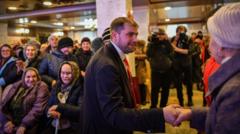The article text:
As Moldova gears up for significant elections this Sunday, the specter of Russian interference looms large, reflecting deeper geopolitical rifts within the nation. President Maia Sandu, campaigning on a staunch pro-European Union platform, faces a cadre of challengers who many believe are sympathetic to Moscow’s interests. In recent months, the heightened vigilance at Chisinau Airport has unveiled a troubling trend: large sums of cash arriving from Russia in a manner that appears orchestrated to influence the political climate.
Customs officials, led by Ruslan Alexandrov, have reported an increase in cash sightings on passengers arriving via flights from Moscow, Istanbul, and Yerevan. The seized amounts, totaling millions of dollars, raise eyebrows regarding their intended purpose, particularly ahead of vital votes that could shape Moldova's future relationship with Europe. At the heart of these allegations lies Ilan Shor, a Moldovan oligarch convicted of fraud who has fled to Russia and is accused of orchestrating a campaign to buy political influence.
This weekend’s elections also feature a referendum on constitutional amendments relating to Moldova’s EU aspirations, further intensifying the stakes. President Sandu’s government has intensified its pro-Western stance since Russia’s invasion of Ukraine, labeling Kremlin influence as a security threat. An alarming situation has emerged whereby allegations of a cash-for-votes scheme implicate Shor and his associates, raising concerns about the integrity of the electoral process.
Veronica Dragalin, Moldova's chief anti-corruption prosecutor, decried the operations, highlighting evidence of payments orchestrated through a Russian bank following scrutiny of cash flows at the airport. To date, investigators estimate over 130,000 voters had been impacted by illegal payments totaling approximately $15 million during the month of September. These developments have been met with criticism from various political factions, sparking fierce debates around Moldova's future direction.
In regions like Gagauzia, where pro-Russian sentiment runs high, local officials have praised Shor’s social initiatives despite international sanctions against him. Shor's message—one calling for national leadership sympathetic to Russia—resonates with segments of the population wary of Western influence, especially regarding issues like LGBT rights. Discontent with EU policies in these communities signals a complex and precarious electoral landscape.
As campaign events ramp up, Sandu faces the challenge of wooing voters while countering narratives that have been shaped by years of economic hardship, corruption, and external interference. Her calls for unity and sustaining Moldova's European path underline the fundamental conflict between pro-EU aspirations and pro-Russian allegiances that define contemporary Moldovan politics.
The results of this weekend's elections could very well determine whether Moldova continues on its trajectory towards EU integration or finds itself swayed by the allure of Russian patronage amidst ongoing geopolitical tensions.
As Moldova gears up for significant elections this Sunday, the specter of Russian interference looms large, reflecting deeper geopolitical rifts within the nation. President Maia Sandu, campaigning on a staunch pro-European Union platform, faces a cadre of challengers who many believe are sympathetic to Moscow’s interests. In recent months, the heightened vigilance at Chisinau Airport has unveiled a troubling trend: large sums of cash arriving from Russia in a manner that appears orchestrated to influence the political climate.
Customs officials, led by Ruslan Alexandrov, have reported an increase in cash sightings on passengers arriving via flights from Moscow, Istanbul, and Yerevan. The seized amounts, totaling millions of dollars, raise eyebrows regarding their intended purpose, particularly ahead of vital votes that could shape Moldova's future relationship with Europe. At the heart of these allegations lies Ilan Shor, a Moldovan oligarch convicted of fraud who has fled to Russia and is accused of orchestrating a campaign to buy political influence.
This weekend’s elections also feature a referendum on constitutional amendments relating to Moldova’s EU aspirations, further intensifying the stakes. President Sandu’s government has intensified its pro-Western stance since Russia’s invasion of Ukraine, labeling Kremlin influence as a security threat. An alarming situation has emerged whereby allegations of a cash-for-votes scheme implicate Shor and his associates, raising concerns about the integrity of the electoral process.
Veronica Dragalin, Moldova's chief anti-corruption prosecutor, decried the operations, highlighting evidence of payments orchestrated through a Russian bank following scrutiny of cash flows at the airport. To date, investigators estimate over 130,000 voters had been impacted by illegal payments totaling approximately $15 million during the month of September. These developments have been met with criticism from various political factions, sparking fierce debates around Moldova's future direction.
In regions like Gagauzia, where pro-Russian sentiment runs high, local officials have praised Shor’s social initiatives despite international sanctions against him. Shor's message—one calling for national leadership sympathetic to Russia—resonates with segments of the population wary of Western influence, especially regarding issues like LGBT rights. Discontent with EU policies in these communities signals a complex and precarious electoral landscape.
As campaign events ramp up, Sandu faces the challenge of wooing voters while countering narratives that have been shaped by years of economic hardship, corruption, and external interference. Her calls for unity and sustaining Moldova's European path underline the fundamental conflict between pro-EU aspirations and pro-Russian allegiances that define contemporary Moldovan politics.
The results of this weekend's elections could very well determine whether Moldova continues on its trajectory towards EU integration or finds itself swayed by the allure of Russian patronage amidst ongoing geopolitical tensions.




















